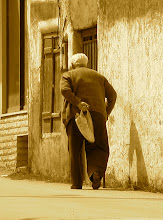
'Bliss' is the name of a cafe in central Athens with which I am familiar, which I like and which is, in certain ways, faithful to its name (and whose awning this photograph is of); 'Bliss' is also the name of a street in the Hamra area of Beirut, where I live. The front windows and balconies of my apartment overlook it and, beyond it, over the luscious green trees and sandstone edifices of the American University of Beirut, to the Mediterranean sea. Somewhere over there lies the island of Cyprus. This street, however, is very far from being faithful to its name.
The back of my apartment looks over (what is also visible from Bliss Street) a building site. There used to be a decrepit old building there; one day (it took only one day) it was torn down, and the space it occupied was gradually turned into a car park, standard practice in Beirut when land ownership is contested. Such car parks/legal ownership disputes usually take a standard two years...but not this one. My rear balcony is now unusable during the day: I have removed the benches, chairs, tables and plants from it, and now rarely venture out there. Even in the evening, when the work has stopped, it is not a habitable place, due to the dust kicked up by the machines. This is what now inhabits that space:



There are, in Beirut, a range of organisations (largely fruitlessly) trying to do something about the bespoiling of Beirut's architectural and aesthetic heritage (what little there is left of it), for example http://www.savebeirutheritage.com/. They organise demonstrations, petitions, put up flyers everywhere they can (and yes, of course, they have a Facebook page...). All of this interests me, of course; I've written extensively about it on this blog, so I won't re-hash the arguments again here. I took these pictures partly in order to record what is happening to my own little bit of Beirut, partly to get out my frustration (I have been ill the last few days, but trying to get any rest of course when my bedroom gives out onto this scene is nigh on impossible).
But something caught my attention when I examined the third of the three photographs; call it what you will - a moment's respite, a vacant stare, a minute of rest, a breath, a contemplative instant - but it brought to mind the invisibility of the people who are doing the work that the rest of us complain about and would rather were not happening. There are a lot of such people in Beirut, because there are a lot of building sites; I can hear three separate ones from my place of work, and two (not including this one) from where I live. There is no aural peace (and this being Beirut, there are no decibel police or effective by-laws to stop certain things happening at certain times). We complain, and we suffer - about the noise, dust, destruction of Beirut. We then drive through Doura or Hazmieh, and see hordes of Syrians (mainly), Ethiopians, Egyptians, waiting for a chance, a possibility, to spend a day behind my house in order to earn 25,000 Lira (about $17 or so) doing what you see them doing above. On Sundays, of course, there's no work. Unless they can get 'in' with the contractor, there is no guarantee that they will work every day, And when they have finished for the day, they return to where they were picked up from, to a room in a building which is either being constructed, or is waiting to be demolished, with no amenities, no windows, and where they are charged much of what they earn on a daily basis to share that room with several other people living much the same precarious existence.
We rarely connect these two things...
In the meantime, we complain about the noise, the dust, the destruction of Beirut...
We don't complain about those working because they are, of course, invisible...
"Globalisation means many things. At one level, it talks of trade, which since the 16th century has exchanged goods and now, increasingly, ideas and information across the globe. But globalisation is also a view of the world - it is an opinion about man and why men are on the world. One in five of all the people on the globe benefits from this system. Four in five suffer in differring degrees from the new unnecessary poverty. Part of the fanaticism of the economic system that we now call globalisation, part of its bigotry, is that it pretends that no alternative is possible. And it's simply not true."
This was what John Berger wrote about the photographic work of Sebastiao Salgado. Wrote, without knowing it, about the three (at times more) men working behind my house. Men who I rarely remember are men because I am more concerned with noise, dust, the destruction of Beirut's heritage.
Men who are, for the most part, invisible...
And this is the film that Berger and Salgado made, about the three, invisible men who work behind my building:

and the future of the tree on the second photo?
ReplyDeleteIscia
thanks for the blog! the tree is not part of the lot, it seems!
ReplyDelete